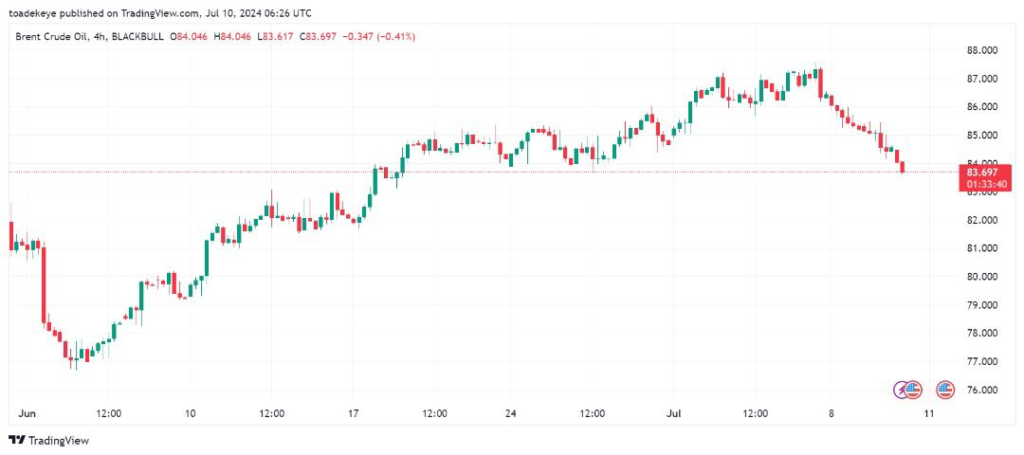
Oil prices eased more than 1% on Tuesday after traders learned that prolonged supply disruptions from Hurricane Beryl were unlikely after a U.S. oil-producing hub in Texas suffered less storm damage than feared. Brent crude futures settled at $84.66 a barrel, falling by 1.3% while U.S. crude settled at $81.41 at, dropping by 1.1%.
Gold Slips Below $2,360 Amid Intense Fed Rate Cut Speculation
Gold dipped below $2,360 per ounce on Tuesday, continuing its decline from the over-one-month-high of $2,390 reached on July 5th, as market participants evaluated the Federal Reserve’s anticipated timing and scale of interest rate reductions in the coming quarters. Concerns about the risks associated with excessive tightening have heightened, particularly with signs of weakening in the labor market. Many analysts have positioned themselves for the central bank to begin reducing interest rates in September, with expectations for another cut later in the year.
German Exports Decline in May buoyed by Weak Global Demand
German exports in May fell more than anticipated, driven by weakened demand from China, the United States, and European nations. The month saw a 3.6% decrease in exports compared to April. Despite this, Germany maintained a trade surplus of 24.9 billion euros ($26.9 billion) in May, up from 22.2 billion euros in April and 16.8 billion euros from the previous year’s May. Within the EU, exports dropped by 2.5% month-on-month, while exports outside the EU declined by 4.9%. Specifically, exports to the U.S., Germany’s largest market, fell by 2.9% compared to the previous month, those to China decreased by 10.2%, and exports to Russia saw a significant decline of 19.3%.
Egypt’s Current Account Deficit Triples To $17.1bn, As FDI Inflows Hit $23.7bn
Egypt’s current account deficit soared to $17.1 billion in the first nine months of fiscal 2023/24, significantly higher than the $5.3 billion recorded a year earlier. This increase was driven by a sharp decline in oil exports, which plummeted by $7.2 billion to $4.6 billion. Imports of oil products also surged by $1.5 billion, while natural gas imports increased by $268.2 million during the July-March period. These developments come amidst power shortages and increased demand for cooling due to a heatwave in the North African country.
Despite these challenges, Egypt saw a notable expansion in net foreign direct investment inflows, which tripled to $23.7 billion compared to $7.9 billion in the same period the previous year.
Nigeria’s External Reserves Surge To $34.66bn
Nigeria’s external reserves surged by $1.88 billion to reach $34.66 billion as of July 4, 2024, marking the highest level in 13 months. This surpasses the $34.69 billion recorded on June 13, 2023, just before the government unified the exchange rate. However, on June 14, 2023, the Central Bank of Nigeria (CBN) introduced a strategy to consolidate the foreign exchange market by merging all segments into a single unified system. This move aimed to enhance liquidity and stability within Nigeria’s FX market. Despite these efforts, global forex reserves surged to $12.3 trillion by the end of 2023, while Nigeria’s forex reserves decreased to $32.3 billion. This represents only 0.26% of global reserves, down from 0.36% in 2022, largely due to reduced forex inflows and increased outflows.














